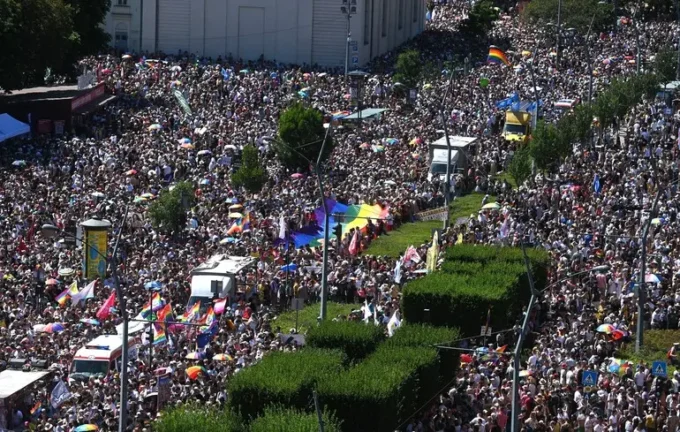Budapest Becomes Arena of Large-Scale Protests on the Day of the Banned LGBTQ+ March

On Saturday, the Hungarian capital Budapest became the epicenter of one of the largest protest actions in recent years, which evolved from a previously permitted march in support of LGBTQ+ rights into a massive anti-government demonstration. Thousands of Hungarians gathered on the city’s main streets to express their opposition to Viktor Orbán’s government policies, which for many years have been tightening restrictions on the rights of the LGBTQ+ community and promoting the government’s ideological stance. According to Reuters reporters, tens of thousands of people participated in the event, moving in a dense human stream from a square near the city hall to one of the main bridges crossing the Danube River. Participants of the March for LGBTQ+ Rights showcased vibrant symbolism — rainbow flags, colorful raincoat attire, posters with sarcastic and critical slogans targeting the Prime Minister. One of the posters read: "None of us are free until all of us are free." This action essentially became a symbol of resistance and protest against the increasing censorship and restrictions on LGBTQ+ rights, ongoing in the country for several years. It should be noted that Orbán’s government has long sought to restrict the activities of the LGBTQ+ movement by passing laws that complicate the organization of pride marches and prohibit media and educational institutions from covering topics related to sexual minorities’ rights. Specifically, in March this year, the parliament approved a law allowing the banning of gay pride parades and marches under the pretext of "protecting children and preventing the development of their sexuality." Opponents and Western politicians condemned this step, viewing it as an attempt to strengthen censorship and undermine democratic freedoms ahead of parliamentary elections scheduled for next year. In the backdrop of these events, ultra-right radicals threatened to disrupt the peaceful march, but police quickly arrested several of them and changed the march’s route to prevent violence and clashes between participants and radical groups. Hungarian Prime Minister Viktor Orbán, who has been leading the country for a long time, positions himself as a defender of traditional family values and conservative ideology. To this end, he emphasizes that protecting children takes precedence over all other rights. On the day of the event, Orbán posted photos with grandchildren on social media, captioning them: “This is what I am proud of.” This message is frequently used by the politician to contrast his personal life with the “gray” mood in society regarding minority rights. Participants from 30 countries attended the event, including 70 delegates from the European Parliament. Many foreign embassies expressed support for the march, and European Commission President Ursula von der Leyen called on the Hungarian government to permit the march and ensure its safe conduct. Budapest Mayor Gergely Karácsony attempted to circumvent the law by organizing the event as a municipal activity that, according to him, does not require a special permit. However, the police rejected this initiative, stating that the march falls under the scope of the law on child protection and banned its organization. Political reporters note that due to this ban, along with the overall political atmosphere in the country, the risk of protest activity has increased. Justice Minister Bence Tuzson warned in a letter to foreign diplomatic missions that organizing a banned event could lead to up to one year of imprisonment, and participation could result in administrative fines. The law allows law enforcement to use video surveillance and face recognition tools to identify participants. After initial police actions and restrictions, public opinion began to shift. Although in the short term Orbán’s approval ratings rose as a result of his strict measures, society has gradually started to express dissatisfaction with the legal and political battles over LGBTQ+ rights. Loss of support from parts of the population is contributing to political changes — centrist candidate Pétár Magyar from the Tisza party is gradually gaining popularity and has overtaken Fidesz in recent polls with a lead of 15%. In response, the government has intensified its rhetoric on morality and traditional values, aiming to strengthen its position ahead of upcoming elections. Regarding LGBTQ+ rights and the marches in the country, the official response remains ambiguous: several embassies and political forces have expressed support for citizens’ rights to assemble and voice their positions. Regardless of ideological differences, this event marked a new stage in Hungary’s internal political and social tensions, which continue to be a focus of international attention.

